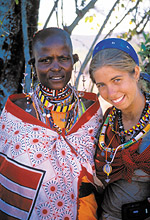African Tempo
Open gallery

by Regina McConaghy ’03
Regina McConaghy composed this essay from the journal she kept during an overseas study program to Kenya and Tanzania in fall 2002. Led by Dan Kelley, Watzek reference librarian, the program focused on the history, natural history, ecology, culture, and socioeconomic institutions of East Africa. McConaghy, who hails from Kennewick, Washington, graduated in May with departmental honors in German studies and a minor in English. She is also a member of Phi Beta Kappa. McConaghy plans to pursue graduate work in German at the University of Wisconsin at Madison this fall.
Time is different in East Africa. That was clear from the start. Our in-country coordinator, David Sperling, was in no rush to get our bewildered gaggle of excited, yet slightly anxious, travelers anywhere. Forty-five minutes after the luggage was loaded, we meandered luxuriously onto the bus, which eventually started. We pulled out of the airport parking lot, past a field where giraffes were grazing, and began rambling down the two-lane highway that links Nairobi and Mombasa at the genteel speed of 55 miles per hour.
David’s laid-back attitude and openness to spontaneity were not merely the application of wisdom resulting from years of meeting travel-weary Lewis & Clark students and their group leaders at the Nairobi airport. Under the equatorial sun, “Hakuna haraka,” or “no rush,” is the credo. There will be time for everything … eventually. I discover on my seventh day in-country that the travesty of losing my wristwatch in the packing shuffle has become laughable—something I worried about “back then,” when I was that other, more linear, less balanced person … all of seven days ago.
I’ve always thought of time as a largely human construct, an invention of modern society. In ancient and medieval Europe, time belonged to the sphere of the church’s influence. It was used to track and regulate prayer. It became more secularized and precise during the Industrial Revolution for purposes of factory operation and shipping. But really, what is an hour? What is a minute? The earth rotated and orbited uniformly before humans came, assigned increments, and wanted to count.
In the United States, we say time is money. The product is the goal, and we want “it” faster, newer, better, now, five minutes ago. Time is linear, and people rush through with teeth clenched, loath to have others reach the finish line first, yet afraid that the race will end, and fearful of a vast, unknown reality that is not racing. Time is a finite resource; people are unwilling to give it, lose it, or waste it as they jockey for position—fearing they will not have enough for themselves.
I have often wondered: What is time when you don’t have a wristwatch? When your day is not divided into precise increments, designed and coordinated to ensure the most efficient production and consumption of goods? When the 11th commandment, “Thou shalt be punctual,” is not a major tenet of your society?
Welcome to Kenya. Time is different here, and life is not run on the rat-race track. Living in a mostly agrarian society—and a subsistence agrarian society at that—people are more in tune with the cyclical patterns of natural time: the change of the seasons from dry to wet, the arrival and departure of the monsoons, the ebb and flow of the tide, even the lazy nonchalance of the sun gliding across the sky. I have yet to see a calendar, and although some people have watches, they do not invest anger or anxiety in each other’s coordination and compliance (or lack thereof) with timekeeping. Much like mass or energy, time is conserved in a cyclical system. It cannot be lost or wasted.
Days on safari drift on languorously, our behavior determined by natural signals. We awake with the sun, grow sleepy with the falling dusk, and eat at the prompting of our growling stomachs. In Stone Town, Zanzibar, the passage of time, should one care to track it, is punctuated by the haunting call to prayer emitting five times daily from the minarets of various mosques; in Nairobi it is marked by the cycle of crowded buses and musical minibus share-taxis, known colloquially as matatus. Even in the little bubbles of postcolonial beach-house luxury interspersed along the coast, time is told not by hands on a clock, but by the gentle clinking of teacups set out on the table. Hours and minutes are precious because of how one fills them: braiding hair, tending the herds, telling stories around a campfire, chatting with friends, welcoming visitors with open hearts and arms.
More L&C Magazine Stories
Lewis & Clark Magazine is located in McAfee on the Undergraduate Campus.
MSC: 19
email magazine@lclark.edu
voice 503-768-7970
fax 503-768-7969
The L&C Magazine staff welcomes letters and emails from readers about topics covered in the magazine. Correspondence must include your name and location and may be edited.
Lewis & Clark Magazine
Lewis & Clark
615 S. Palatine Hill Road MSC 19
Portland OR 97219

